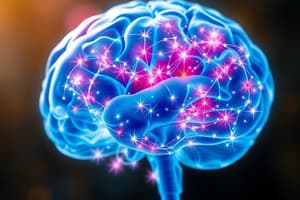Podcast
Questions and Answers
Which subfield of psychology focuses on mental processes such as perception and memory?
Which subfield of psychology focuses on mental processes such as perception and memory?
- Cognitive Psychology (correct)
- Biopsychology
- Developmental Psychology
- Social Psychology
What does developmental psychology primarily examine?
What does developmental psychology primarily examine?
- The influence of the environment on behavior
- Psychological growth throughout the lifespan (correct)
- Observable behaviors and their modification
- Unconscious motivations and childhood experiences
Which research method involves assessing relationships between variables without manipulating them?
Which research method involves assessing relationships between variables without manipulating them?
- Correlational Studies (correct)
- Cross-sectional Studies
- Case Studies
- Experiments
What is the primary focus of biopsychology within psychology?
What is the primary focus of biopsychology within psychology?
Which psychological approach emphasizes observable behaviors and the impact of the environment?
Which psychological approach emphasizes observable behaviors and the impact of the environment?
What does the psychoanalytic theory primarily focus on?
What does the psychoanalytic theory primarily focus on?
Which area of psychology applies principles to enhance learning and teaching methods?
Which area of psychology applies principles to enhance learning and teaching methods?
What type of study involves tracking changes over time in the same subjects?
What type of study involves tracking changes over time in the same subjects?
Study Notes
General Psychology
-
Definition: General psychology is the scientific study of the mind and behavior, encompassing various subfields and approaches.
-
Key Areas of Study:
- Cognitive Psychology: Focuses on mental processes such as perception, memory, reasoning, and decision-making.
- Developmental Psychology: Examines psychological growth and changes across a lifespan, including childhood, adolescence, and aging.
- Social Psychology: Investigates how individuals influence and are influenced by others, including topics like group dynamics, conformity, and aggression.
- Clinical Psychology: Concerned with diagnosing and treating mental disorders and emotional problems.
- Biopsychology: Explores the relationship between biological processes and psychological phenomena, including brain function and neurotransmitters.
-
Research Methods:
- Experimental: Involves manipulation of variables to determine cause-effect relationships.
- Correlational: Assesses relationships between variables without manipulation; does not imply causation.
- Longitudinal and Cross-sectional Studies: Longitudinal studies track changes over time, while cross-sectional studies examine different groups at a single point in time.
- Case Studies: In-depth analysis of an individual or group to understand complex issues.
-
Major Theories:
- Behaviorism: Focuses on observable behaviors and the influence of the environment; key figures include B.F. Skinner and John Watson.
- Cognitive Theory: Emphasizes mental processes and how they influence behavior; key figure includes Jean Piaget.
- Psychoanalytic Theory: Developed by Sigmund Freud, focusing on unconscious motivations and childhood experiences.
- Humanistic Psychology: Stresses individual potential and personal growth; key figures include Carl Rogers and Abraham Maslow.
-
Applications:
- Mental Health: Psychotherapy and counseling techniques derived from various psychological theories.
- Education: Psychological principles applied to enhance learning and teaching methods.
- Workplace: Industrial-organizational psychology focuses on behavior in professional settings to improve productivity and well-being.
- Health Psychology: Studies how psychological factors affect health and illness, promoting healthy behaviors.
-
Important Concepts:
- Nature vs. Nurture: Ongoing debate regarding the influence of genetics (nature) and environment (nurture) on behavior.
- Critical Periods: Specific times during development when certain skills or traits are most readily acquired.
- Cognitive Dissonance: The mental discomfort experienced when holding two conflicting beliefs or values.
-
Ethics in Psychology:
- Importance of informed consent, confidentiality, and the right to withdraw from studies.
- Protecting participants from harm and ensuring the integrity of research.
Definition and Scope
- General psychology is the scientific study focused on the mind and behavior, integrating various subfields and approaches.
Key Areas of Study
- Cognitive Psychology: Investigates mental functions like perception, memory, reasoning, and decision-making.
- Developmental Psychology: Studies psychological growth throughout different life stages, including childhood and aging.
- Social Psychology: Analyzes how individuals affect and are influenced by social interactions, exploring topics like group dynamics and conformity.
- Clinical Psychology: Involves diagnosing and treating mental health disorders and emotional issues.
- Biopsychology: Examines the links between biological factors and psychological phenomena, including the roles of the brain and neurotransmitters.
Research Methods
- Experimental Methods: Involve modifying variables to establish cause-and-effect relationships.
- Correlational Studies: Explore relationships between variables without altering them, cautioning that they do not denote causality.
- Longitudinal Studies: Follow the same subjects over time to observe changes, contrasting with cross-sectional studies that analyze different groups at one time.
- Case Studies: Provide in-depth insights into an individual or group to comprehend complex psychological issues.
Major Theories
- Behaviorism: Concentrates on observable behaviors shaped by environmental factors; notable psychologists include B.F. Skinner and John Watson.
- Cognitive Theory: Focuses on mental processes shaping behavior; significant figure is Jean Piaget.
- Psychoanalytic Theory: Developed by Sigmund Freud, it deals with unconscious desires and childhood experiences.
- Humanistic Psychology: Emphasizes personal growth and potential; founded by Carl Rogers and Abraham Maslow.
Applications of Psychology
- Mental Health: Utilizes psychotherapeutic techniques from diverse psychological theories for treatment.
- Education: Applies psychological insights to improve teaching and learning strategies.
- Workplace Psychology: The field of industrial-organizational psychology enhances workplace behavior for greater productivity and employee well-being.
- Health Psychology: Connects psychological factors with health outcomes, promoting healthful behaviors.
Important Concepts
- Nature vs. Nurture: Explores the impact of heredity versus environment on behavior.
- Critical Periods: Identifies key developmental stages when specific abilities or traits are more easily acquired.
- Cognitive Dissonance: Describes mental discomfort arising from conflicting beliefs or values.
Ethics in Psychology
- Emphasizes informed consent, confidentiality, and participants' rights to disengage from studies.
- Ensures participant well-being and research validity by protecting individuals from harm.
Studying That Suits You
Use AI to generate personalized quizzes and flashcards to suit your learning preferences.
Description
Explore the fundamental concepts of general psychology, which covers the study of the mind and behavior across various subfields such as cognitive, developmental, and social psychology. This quiz will test your knowledge on different research methods and key areas of study within the discipline.




